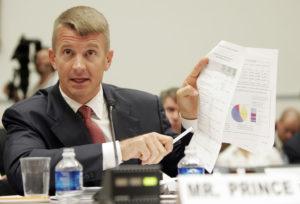DeVos Plan Makes It Harder for Defrauded Students to Get Loan Relief
The proposal, which aims to replace a set of Obama-era rules that were never implemented, draws praise from the for-profit college industry but sharp criticism from advocacy groups that represent student borrowers.Students who are defrauded by their schools would have a harder time getting their federal loans erased under new rules proposed by the Trump administration on Wednesday.
The proposal, which aims to replace a set of Obama-era rules that were never implemented, drew applause from the for-profit industry but sharp criticism from advocacy groups that represent student borrowers.
Education Secretary Betsy DeVos said the proposal lays out clear rules schools must follow to avoid trouble, while also protecting students harmed by deception.
“Our commitment and our focus has been and remains on protecting students from fraud,” DeVos said.
Under the proposal, students would be eligible for loan relief if they can prove their schools knowingly misled them with statements or actions that directly led them to take out loans or enroll at the school.
That would be a higher bar than rules finalized under Obama in 2016 after the collapse of two for-profit schools, Corinthian Colleges and ITT Technical Institute. Those rules allowed relief in a wider range of cases dealing with breach of contract.
Education Department documents supporting DeVos’ proposal argue that, while students should be protected from fraud, they also have an obligation to do their research before picking schools.
“Postsecondary students are adults who can be reasonably expected to make informed decisions if they have access to relevant and reliable data about program outcomes,” the department said.
The new proposal is estimated to save nearly $13 billion over the next decade compared to spending estimates under the Obama rules, primarily by reducing the amount of loan relief awarded to students.
The department said it had received more than 100,000 borrower defense claims from students since 2015.
Schools would also have an opportunity to respond to claims of fraud, under the new proposal, which says schools should have a chance to defend themselves against unsubstantiated claims that could damage their reputations and their revenue.
It would also allow schools to force students into arbitration agreements barring them from suing the school, a practice used by some for-profit colleges that would have been banned under Obama’s rules.
The Education Department said the new rules would apply to loans taken out after July 1, 2019.
Opponents blasted the proposal, saying it places schools ahead of students and discourages victims from pursuing debt relief.
“It encourages abusive and predatory institutions to continue to rip off students with impunity, while slamming the door on the debt relief that Congress has instructed the department to provide to cheated students,” said Toby Merrill, director of the Project on Predatory Student Lending at Harvard University.
Bob Shireman, a senior fellow at the Century Foundation and a former education official under Obama, said the proposal “is perhaps the most damaging action Betsy DeVos has taken since assuming office.”
“These changes would effectively strip students of their right to recourse if they believe that a college or university has misled them, making it next to impossible for defrauded students to get the relief they are entitled to,” he said.
But the changes were hailed as an improvement by the for-profit college industry and some Republicans.
Steve Gunderson, president and CEO of the trade group Career Education Colleges and Universities, said previous versions of the rules allowed for “carte blanche approval” of fraud claims, to the detriment of schools and their students.
“The department has undertaken a thoughtful and deliberate approach to this rule, and we applaud their hard work on this important matter,” Gunderson said.
Sen. Lamar Alexander, a Republican from Tennessee and chairman of the Senate’s education committee, said DeVos’ proposal will prevent taxpayers from footing the bill for “unreasonable or unsubstantiated claims of fraud.”
“The Obama administration went too far in rewriting this provision by setting overly broad and vague standards and as a result, put taxpayers on the hook for too many loans,” he said.
Education officials under Obama created new rules to clarify the debt relief process after thousands of students said they were defrauded by for-profit colleges.
Before that, federal officials relied on a patchwork of state laws to determine if students deserved loan forgiveness.
Shortly before the updated rules were scheduled to take effect last year, DeVos delayed them and opened the process to rewrite them. Meanwhile, the Education Department’s work processing fraud claims has ground to a halt, with nearly 100,000 pending applications.
Your support matters…Independent journalism is under threat and overshadowed by heavily funded mainstream media.
You can help level the playing field. Become a member.
Your tax-deductible contribution keeps us digging beneath the headlines to give you thought-provoking, investigative reporting and analysis that unearths what's really happening- without compromise.
Give today to support our courageous, independent journalists.






You need to be a supporter to comment.
There are currently no responses to this article.
Be the first to respond.